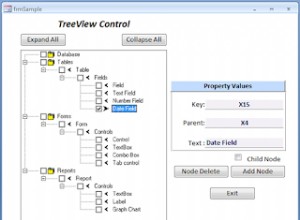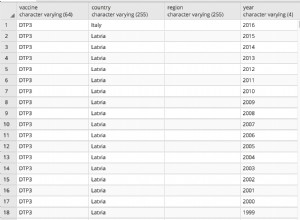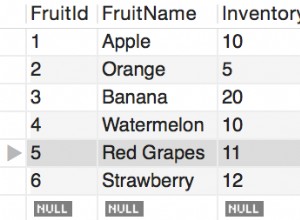In Postgres cataloghi di sistema sono l'insieme di base delle informazioni complete sull'installazione e sui database. I cataloghi di sistema sono la fonte di informazioni più affidabile.Schema informativo come funzionalità ausiliaria si basa sui cataloghi di sistema ed è fornita per la compatibilità con altri RDBM:
Le viste materializzate non sono oggetti standard SQL, quindi lo schema delle informazioni non contiene informazioni su di esse.
Il catalogo di sistema pg_class contiene tutte le informazioni sui privilegi nella colonna relacl .
Se la colonna è null quindi il proprietario ha tutti i privilegi.
Una stringa vuota come nome utente in acl string significa public .
create materialized view test_view as select 1;
grant select on test_view to public;
grant delete on test_view to a_user;
select
coalesce(nullif(s[1], ''), 'public') as grantee,
s[2] as privileges
from
pg_class c
join pg_namespace n on n.oid = relnamespace
join pg_roles r on r.oid = relowner,
unnest(coalesce(relacl::text[], format('{%s=arwdDxt/%s}', rolname, rolname)::text[])) acl,
regexp_split_to_array(acl, '=|/') s
where nspname = 'public' and relname = 'test_view';
grantee | privileges
----------+------------
postgres | arwdDxt
public | r
a_user | d
(3 rows)
Hai bisogno di una funzione per mostrare i privilegi in leggibile formato:
create or replace function priviliges_from_acl(text)
returns text language sql as $$
select string_agg(privilege, ', ')
from (
select
case ch
when 'r' then 'SELECT'
when 'w' then 'UPDATE'
when 'a' then 'INSERT'
when 'd' then 'DELETE'
when 'D' then 'TRUNCATE'
when 'x' then 'REFERENCES'
when 't' then 'TRIGGER'
end privilege
from
regexp_split_to_table($1, '') ch
) s
$$;
Usa:
select
coalesce(nullif(s[1], ''), 'public') as grantee,
priviliges_from_acl(s[2]) as privileges
from
pg_class c
join pg_namespace n on n.oid = relnamespace
join pg_roles r on r.oid = relowner,
unnest(coalesce(relacl::text[], format('{%s=arwdDxt/%s}', rolname, rolname)::text[])) acl,
regexp_split_to_array(acl, '=|/') s
where nspname = 'public' and relname = 'test_view';
grantee | privileges
----------+---------------------------------------------------------------
postgres | INSERT, SELECT, UPDATE, DELETE, TRUNCATE, REFERENCES, TRIGGER
public | SELECT
a_user | DELETE
(3 rows)




